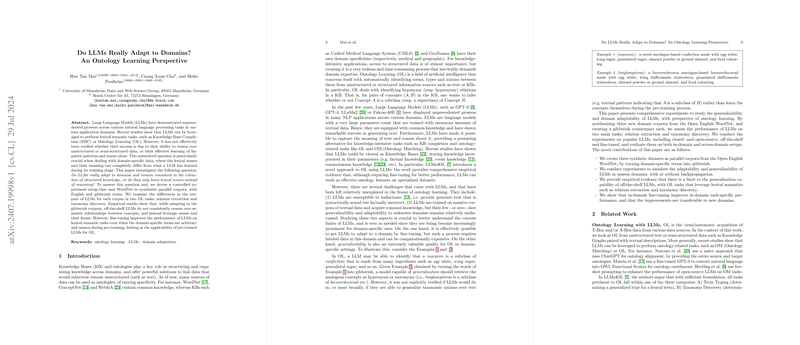Overview of Domain Adaptation in LLMs: An Ontology Learning Perspective
This paper addresses an essential question in the paper of LLMs: their ability to adapt to domain-specific data for ontology learning tasks. Researchers Huu Tan Mai, Cuong Xuan Chu, and Heiko Paulheim critically examine whether LLMs inherently adapt to novel domains or if their successful performance hinges primarily on the lexical senses acquired during pre-training. They scrutinize this through carefully controlled experiments involving two main ontology learning tasks: relation extraction and taxonomy discovery.
Experimental Procedure
The researchers utilize WordNet to create a set of domain-specific corpora with parallel representations in gibberish, simulating environments outside the LLMs' prior training. This method achieves a controlled and rigorous evaluation framework by stripping away recognizable lexical senses to focus solely on relational and semantic reasoning. The synthesized domains—Sweets, Football, and Music—are explored with varying hypernym relationships, and tests are conducted across widely used LLMs including GPT-3.5, GPT-4, Falcon-40B, LLaMa2-13B, and Zephyr-7B-.
Key Findings
The paper reveals a significant decline in LLM performance when domain concepts are replaced with gibberish equivalents, yet some ability to perform ontology learning tasks remains. This indicates a strong dependency on lexical priors rather than a genuine reasoning capability to extrapolate principles of ontology learning from domain-specific relationships. The paper shows that the semantic priors LLMs develop during pre-training on vast corpora entail limitations in generalizing to new, arbitrary domains where semantics are unknown or altered.
A salient result is that fine-tuning facilitates adaptation to domain-specific taxonomy discovery tasks, even when using gibberish datasets. Notably, fine-tuned models demonstrated improved performance in relation discovery tasks beyond their pre-tuning baseline, although never fully achieving equivalency with their performance on real-word datasets. The paper adeptly highlights that fine-tuning can enhance a model’s sensitivity to syntactic and relational clues beyond its pre-trained lexical knowledge.
Implications and Future Directions
The implications of these findings have substantial theoretical and practical relevance. Theoretically, the research emphasizes the difficulty LLMs face in abstract reasoning within unfamiliar ontologies absent lexical anchors. Practically, this underlines the necessity of specific adaptation and fine-tuning processes for LLMs to be useful in applications where domain-specific language dominates, such as specialized industry jargon or novel scientific fields.
Future avenues of research might focus on enhancing LLM architectures or training regimes that bridge current gaps in domain accommodation. Adaptation methods or hybrid models that integrate symbolic reasoning might address some of the expressed limitations, paving the way toward more versatile LLM applications.
Conclusion
In conclusion, this paper makes critical strides in understanding LLM adaptability by dissecting their performance through the lens of ontology learning. It underscores the inherent challenges LLMs face when stripped of learned lexical context, critically revealing the need for ongoing adaptation, particularly through fine-tuning. As interest in deploying LLMs across diverse and nuanced fields expands, these insights offer significant value for both the research community and industry practitioners looking to maximize the utility of AI in complex, domain-specific contexts.
